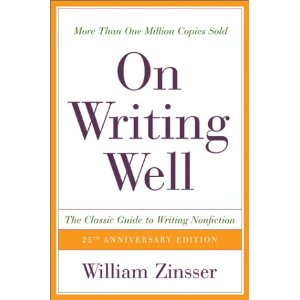Ik lees graag boeken en artikelen over non-fictie schrijven om vervolgens de meest praktische tips zelf toe te passen en te delen.
Het boek van William Zinsser ‘On writing well; the classic guide to non-fiction’ staat inderdaad vol klassieke schrijftips. Hieronder vind je een selectie van zijn tips die ik zelf altijd toepas.
1. Schrijf over je passies of interesses
If you follow your affections you will write well and will engage your readers.
If you write about subjects you think you would enjoy knowing about, your enjoyment will show in what you write.
2. Bepaal je hoofdboodschap
… decide what single point you want to leave in the reader s mind. It will (…) give you a better idea of what route you should follow and what destination you hope to reach.
3. Maak je onderwerp niet te groot
Every writing project must be reduced before you start to write. Therefore think small. Decide what corner of your subject you’re going to bite off, and be content to cover it well and stop.
4. Voorkom dat je eeuwig in de ‘research’ fase blijft steken
Writers who doggedly pursue every last fact will find themselves pursuing the rainbow and never settling down to write.
5. Bepaal van tevoren je rol en toon
In what capacity am I going to address the reader? Reporter? Provider of information? Average man or woman?) ( …)
What style? (Impersonal reportorial? Personal but formal? Personal and casual?)
What attitude am I going to take toward the material? (Involved? Detached? Judgmental? Ironic? Amused?)
6. Schrijf zoals je praat
Never say anything in writing that you wouldn’t comfortably say in conversation.
There is a kind of writing that sounds so relaxed that you think you hear the author talking to you.
7. Maak je eigen metaforen
Metaforen zijn: … helpful, ready to express complex ideas for us in the shorthand form of metaphor.
Maar: … replace them with fresh phrases of your own.
8. Schrijf korte alinea’s
Short paragraphs put air around what you write and make it look inviting, whereas a long chunk of type can discourage a reader from even starting to read.
9. Schrap ieder woord dat geen specifiek doel dient
But the secret of good writing is to strip every sentence to its cleanest components. Every word that serves no function, every long word that could be a short word, every adverb that carries the same meaning that’s already in the verb, every passive construction that … etc
10. Trek je de reacties van de lezer niet persoonlijk aan
You are who you are, he is who he is, and either you’ll get along or you won’t.
Gerelateerde artikelen
7 Schrijftips van zij die het kunnen weten
Wat zegt Stephen King over je excuses om niet te schrijven?
Marlies van der Meer. Laat de klant zien dat jij de beste oplossing bent: Zakelijk Bloggen; (e)Boeken schrijven en Positioneren als Expert. Auteur van Social media marketing voor de ZZP’er
Marlies,
Nice blog post. Clear and to the point. Nice that your headlines are in a different color. It’s scannable and it guides readers through the post.
Don aka @clarityguy
Altijd handig RT @MeerAdvies: 10 klassieke, praktische #schrijftips voor je boek of blog http://bit.ly/RzuxPj #nieuwblog
10 praktische schrijftips voor je boek of blog…. http://t.co/BqGOpYvj